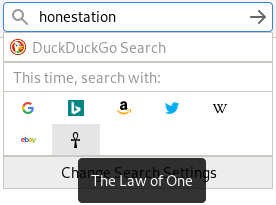By default, the lawofone.info search engine uses “any word”-type searches. These often return many, many results, especially when searching for many terms or a phrase. It is often helpful to switch to an “all words” or “exact phrase”-type search, which you can do using the links at the top of each page of search results:
See also the stemming and short words tips below.
To link to a complete session with a specific question at the top, append “#” plus the question number to the URL. For example, to link to session 10 with question 14 at the top: https://www.lawofone.info/s/10#14. If you have question numbers showing, the session number (10) is a link to the start of the session and the question number (14) is a link to put that particular question at the top of the page:
10.14 Questioner: For general development [of the] reader of this book, could you state some of the practices or exercises to perform to produce an acceleration toward the Law of One?
If you know exactly which question/answer you want, you can search for it using “session.question”. For example, to find session 10, question 14, search for “10.14”: https://www.lawofone.info/results.php?q=10.14.
If you want to highlight a certain phrase, use “hl”, e.g., https://www.lawofone.info/results.php?s=48&hl=forget+you+the+counting#5.
Click the play button (▶) before each question to hear the original recording of Don Elkins asking the question and Ra speaking through Carla Rueckert to give the answer. Show or hide the play buttons with the appropriate link at the bottom of each page of questions and answers:
In Chrome, start typing lawofone.info in the address bar and Chrome will offer tab to search. Press tab to search lawofone.info:![]()
Once you hit tab, Chrome will use the lawofone.info search engine for whatever you type in next:
If your browser lets you add a keyword to bookmarks, you can jump straight to your desired search. For example, in Firefox, you could follow these steps:
Now you can search for, say, “honestation,” by typing “l honestation” in the URL field:

You could add another bookmark to quickly jump to a specific session. Just use “s=%s” instead of “q=%s” in the location field.
You can add lawofone.info to the search engines that your browser offers.
In Firefox, if you use the search bar, click the green plus sign to add lawofone.info as a search engine:![]()
If you don’t use the search bar, you can use the “Page Actions” menu (three dots next to the URL bar) to add lawofone.info as a search engine. After adding it, you will see it in the list of search engines available:
To shorten links, you can use lo1.info or lawof.one. You can link to sessions using s/1 (or whatever session number) and to categories using c/Archetypical Mind. So a short link to question 14 of session 10 would be lo1.info/s/10#14.
The search engine uses stemming to attempt to generate meaningful search results. If you don’t want to use stemming, use “exact phrase” on the search page (even if the phrase is only one word long). For example, an “any word” search for beingness will find “being,” also, but an “exact phrase” search will not.
In “any word” searches, the search engine ignores short words such as “a,” “an,” “and,” and so on. If you want to search for those words, use the “all words” or “exact phrase” types of searches.
By default, the site shows 100 search results at a time. Increase or decrease that on the search page or by using the “l” URL variable.
If you’re using an old browser and can’t connect to https://www.lawofone.info/, you can use http://http.lawofone.info/.
Variables this site can pass in the URL string.
On any page:
On session pages:
On category pages:
On search result pages:
Random question/answer pages:
On difference pages:
The site stores certain preferences in cookies. If a variable is not set in the URL, it will use the value in the cookie, if set. These are the cookie variables:
First published, session, category, version:
Session one showing question numbers, categories, and/or notes:
Copyright ©2003–2026 Tobey Wheelock
Questions? Comments? Email me: tw at law of one dot info.